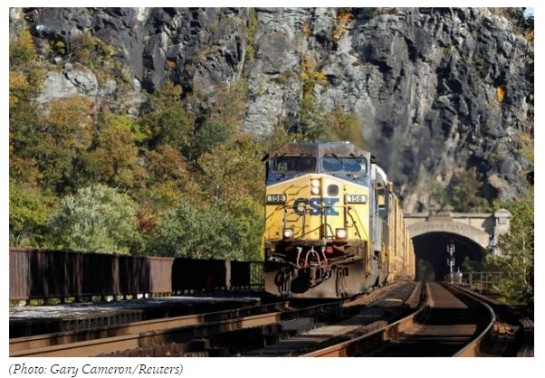http://www.takepart.com/article/2015/02/22/oil-trains-derailment
The High Cost of Oil Trains: Hundreds of Accidents, Hundreds Dead, and $4 Billion in Damages
A federal government report predicts that that railroad vehicles transporting crude oil or ethanol will derail about 10 times annually over the next 20 years.
February 22, 2015 By Kristina Bravo
Kristina Bravo is Assistant Editor at TakePart.
As if we needed more reason to address our fossil fuel addiction, the federal government has put a number on how many times oil-hauling trains could derail in a year: 10 times annually over the next two decades, at a cost of more than $4 billion. Not to mention the hundreds of people just one accident could kill.
Trains Carrying Oil Are Exploding—Find Out If You Live in a Blast Zone
That’s an estimate from a previously unreported survey by the U.S. Department of Transportation, according to The Associated Press. The agency, which completed its analysis in July, examined the risks of moving large amounts of crude oil and ethanol through major cities across the country.
The explosion of a tanker car near Mount Carbon, West Virginia, on Feb. 16 has raised new concern. Twenty-seven of the 109 tanker cars derailed and 19 caught fire in the incident, which a local described as an “inferno.” No injuries other than one case of potential smoke inhalation were reported, but state spokesperson Lawrence Messina said that crude oil is flowing into the Kanawha River, according to the Los Angeles Times.
Investigators reported that the train wasn’t speeding: It was traveling at 33 miles per hour in a 50 mph zone.
The accident was just the latest in a record string of fiery derailments, which some blame on the recent surge in oil production. According to the Pipeline and Hazardous Materials Safety Administration, more than 141 “unintentional releases” from oil tankers were reported in 2014—an all-time high.
“Back-to-back fiery derailments involving crude oil trains should be an unmistakable wake-up call to our political leaders,” Mollie Matteson, a scientist at the environmental group Center for Biological Diversity, told The Washington Post.

